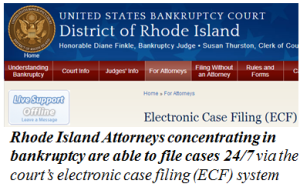The Coronavirus crisis has made many things difficult if not downright impossible. But fortunately — at least for now through early October 2020 — it’s still possible to file bankruptcy in Rhode Island. Here’s a quick list of some of the “essential” details:
- court hearings are being conducted by telephone or video (using Zoom.gov) and can even be viewed via YouTube
- documents are being notarized online
- certain court fees may now be paid online
What hasn’t changed is that there are still Rhode Island attorneys experienced with personal bankruptcy (e.g., Chapter 7 or Chapter 13) who can help guide you through the details of filing bankruptcy. Feel free to give us a call 401-738-3030 or email to set up a free RI bankruptcy consultation.




